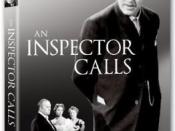"Do you feel that it is possible to respect any member of the Birling family at the end of an Inspector Calls"ÃÂ In the play An Inspector Calls by J.B Priestly, the members of the Birling family are all accused of contributing toward the death of an Eva Smith by a supposed Inspector. The play eventually reveals that the Inspector is an impostor, and the family has been conned. Some of the family revert back to their old ways and laugh about what happened, whereas the others are deeply affected.
The play therefore presents us with a varying degree of changesin the characters, caused by the Inspector's allegations. These changes affect the amount of respect I feel for the characters individually at the end of the play. In order to have a high opinion of someone, they have to conform to my requirements for respect which are; to be independent, loyal, honest (to themselves and others) and open minded with the ability to change.
The character of Sheila Birling is portrayed as being very dependent on her parents as she has been pandered to by her mother. Sheila is quite immature and naÃÂïve, saying "What's this about streets?"àWhen prostitution is being discussed, for example. This lack of independence is a direct consequence of being pampered and indulged by her parents. Toward the end of the play, once Sheila realises that the world is not simplistic, she begins to think for herself, "And I'm not a child, don't forget I have a right to know,"àshe says to her parents.
Sheila stands by her brother Eric and is loyal. This is corroborated at the beginning of Act Three when Mrs Birling states that Eric does not get drunk and Sheila proclaims that "Of course he does. I told you."ÃÂ Eric calls her a "little sneak"ÃÂ but Sheila is not because "[She] could have told [Mrs Birling] months ago, but of course she didn't."ÃÂ This is an important reason for the admiration that I have for Sheila because she did stand by her brother and she did keep her word, showing her ability to be mature.
The capability to be honest to one's self is far more commendable than being honest to others. In the play An Inspector Calls Sheila is able to be honest to herself, she declares to her fiancÃÂé that "this has made a difference. You and I aren't the same people who sat down to dinner here."àShe realises that she has changed, even if no one else has, because of what the Inspector said.
Mrs Birling is shown to be very independent. When talking about the Inspector she states "He certainly didn't make me confess-as you call it. I told him quite plainly that I thought I had done my duty."ÃÂ This clearly illustrates her fixed will and overbearing pesonality.
When talking about her incident with Eva, at the charity shelter, Mrs Birling refuses to be honest with herself, saying that "[Eva] only had herself to blame"ÃÂ When asked, "[Mrs Birling] you recognise her?"ÃÂ she replied "no why should I?"ÃÂ indicating that she can also be dishonest with others. This affects my level of respect for Mrs Birling greatly.
Sybil Birling does not understand that her family could have killed a girl, and when told that the Inspector is a hoax figure she exclaims "didn't I tell you? Didn't I say I couldn't imagine a real police officer talking like that to us?"ÃÂ This portrays to us how Mrs Birling can only think for herself and adopts Mr Birling's philosophy "that [a] man has to mind his own business and look after himself and his own family."ÃÂ It shows us that she is unable to change, a great flaw in her character and I find it very difficult to respect Mrs Birling at the end of An Inspector Calls.





